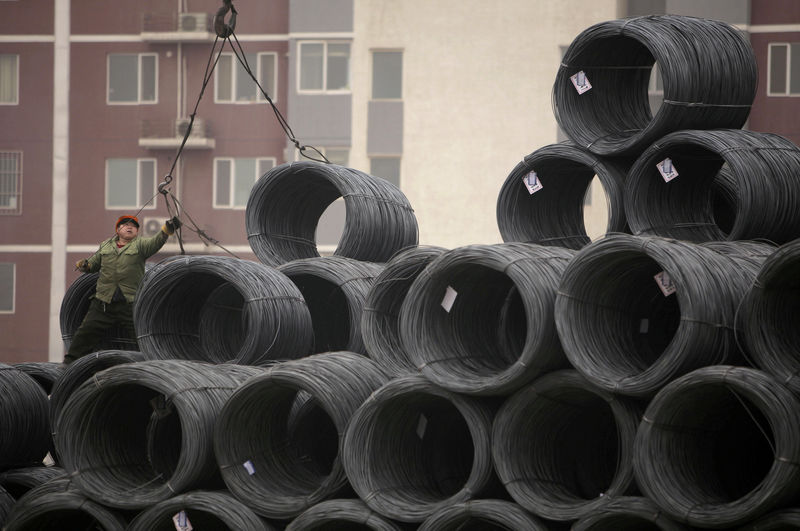By Manolo Serapio Jr and Muyu Xu
MANILA/BEIJING (Reuters) - Tight checks by Chinese customs officials to halt the smuggling of scrap steel to Southeast Asia have forced some exporters to cancel or delay shipments, benefiting rivals like Russia that are prowling for market share amid a raging Sino-U.S. trade war.
Among those that have cancelled or delayed cargoes are Chinese exporters that have been taking advantage of Beijing's generous tax rebate system on value-added steel, according to two Chinese exporters and a major importer in the Philippines, China's third-biggest market.
China has for decades given tax rebates to exporters selling value-added steel, allowing them to undercut competitors. China gave up to $2.8 billion in such rebates in 2017, according to Reuters calculations based on its alloy steel export volumes.
But the system has been abused by exporters who have claimed rebates of 5 percent to 13 percent even for tiny additions of elements such as chromium, while some are alleged to have mislabelled shipments to pass them off as alloy steel. https://reut.rs/2mvvYpn
One of the steel exporters in China's top steelmaking city Tangshan said his company ditched a third of its shipments last month, adding that other shippers had also called off cargoes fearing their tactics to game the tax system may now be exposed.
"People take advantage of tax rebates or forge export documents to avoid taxes, so the tighter checks are raising the risk to those traders," said the Tangshan exporter, who declined to say why his company had cancelled its shipments.
Smuggled scrap metal from China mostly flows to Southeast Asia, the same destination of the biggest portion of its legal steel product exports, according to the sources, who declined to be identified due to the sensitivity of the issue.
The volume of cancelled or delayed deals was relatively small and has so far not knocked back China's exports, which have been driven higher by a wide arbitrage and the nation's increasing output.
"Exports of products such as strips, square bar and wire rods were affected the most during the recent tightened checks from customs," said Linda Lin, steel editor at CRU in Shanghai.
These products account for most of the Chinese steel heading overseas. While total export volumes continued to fall last year, shipments of strips went up by as much as 85 percent, according to customs data.
But the pace of cancellations may quicken when customs authorities introduce new rules on Aug. 1 that require shippers to answer more than 100 questions on a shipment's declaration form, up from 40 questions now.
Customs did not give a reason for the new rules announced in June, but traders expect them to make it harder to evade taxes.
The extra paperwork sparked "panic" among traders, said a Hebei-based steel exporter: "The new regulations will affect a lot of people, especially small trading firms who used the exports loophole to avoid tax and foreign exchange controls."
China's customs office did not respond to requests for comment sent by fax.
(For graphic on China's steel mills chase profits ahead of winter curbs, click https://reut.rs/2LhmJE7)
(For graphic on China's steel exports, click https://reut.rs/2LuhjZQ)
TAX LOOPHOLES
The crackdown may reduce Chinese steel exporters' foothold in Southeast Asia, the destination for about a quarter of its steel products shipments last year.
The cancelled cargoes include several bound for the Philippines, where some major buyers have turned to Russia and the Middle East for supplies.
Two to three Chinese suppliers cancelled shipments of Manila-bound flat steel products in May, and up to four buyers of billet and wire rods were told in June that delivery of their cargoes would be delayed to August, according to a source with a major Chinese steel importer in the Philippines.
"(Chinese steel exporters) told their buyers here that the shipments will be delayed to next month," said the source.
Top Philippine steel producer Steel Asia - which yearly takes about 1.6 million tonnes of billet to make rebar for the local market - said China now accounts for less than 8 percent of its imports, compared with almost 90 percent in 2016. It now gets most of its supplies from Russia and the Middle East.
"Availability and cost of billets are the main consideration for shift in supply," Steel Asia said.
Also, in Vietnam, China's second-biggest market after South Korea, most steel firms will likely stop importing from China to avoid heavy U.S. import duties that Washington imposed on steel products from Vietnam it says originated in China.
Other major markets, including Indonesia and Thailand, have not seen any recent cancellations, according to an Indonesian trade official and the head of a Thai steel industry group.
Still, combined with Beijing's escalating trade dispute with Washington, the extra customs scrutiny will make it harder to sell Chinese steel products abroad, traders and analysts said. That could help ease tensions with the United States, which has called for China to reduce its big trade surplus.

China will likely "further lift the threshold of tax rebate for steel exports considering the escalated global trade spat and Beijing's intensifying environmental push," said CRU's Lin.